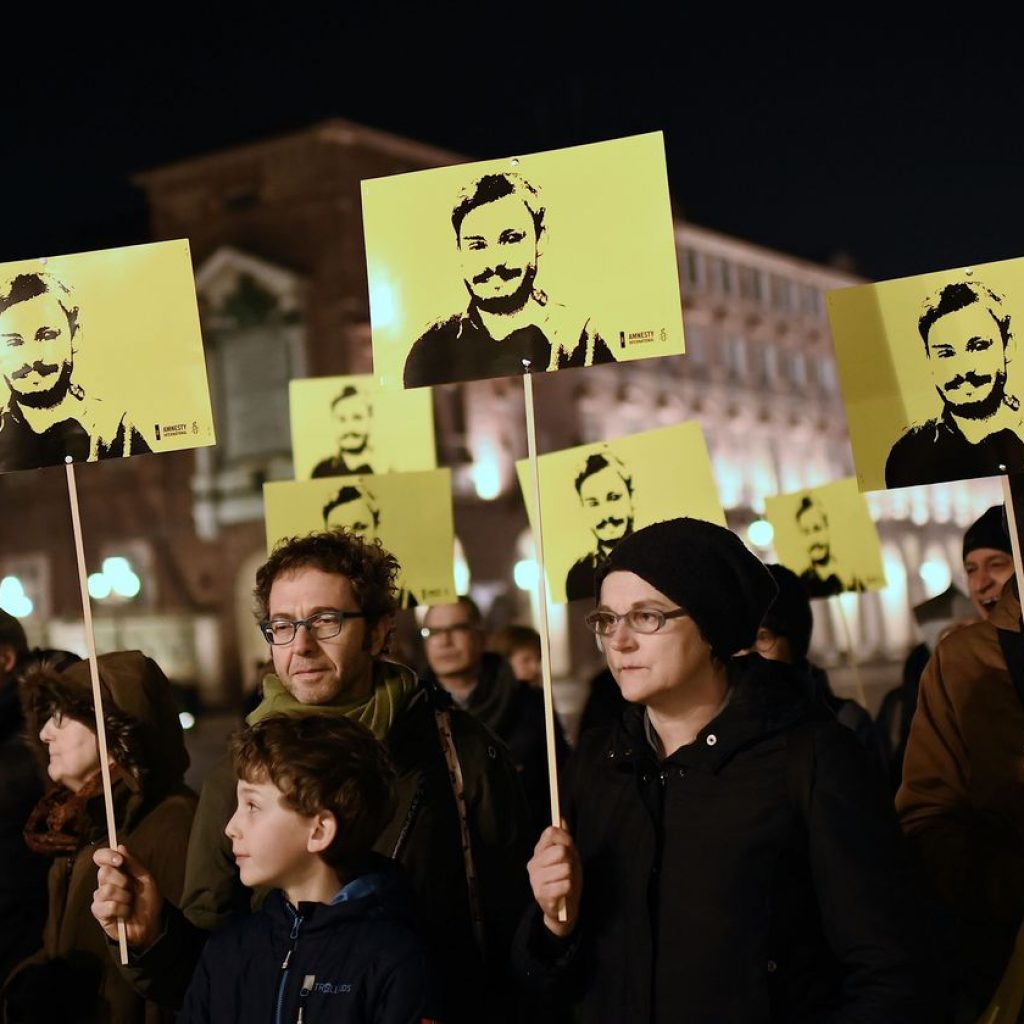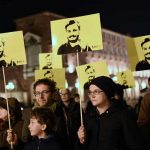By The Wall Street Journal –
Italian prosecutors’ investigation into the torture and killing of Giulio Regeni in Cairo is shining a light on Egypt’s human-rights abuses.
ROME—Italian student Giulio Regeni moved to Cairo in September 2015 to research Egypt’s independent labor unions for his Ph.D. thesis at Cambridge University. Months later, the 28-year-old was found dead on the side of a highway, bearing cigarette burns, broken teeth and fractured bones.
Italian prosecutors last week pressed charges against four members of Egypt’s security forces over Mr. Regeni’s abduction, torture and death as they laid out the most detailed case to date against the government of Egyptian President Abdel Fattah Al Sisi, for whom it has become a source of severe international embarrassment.
It was the first full judicial investigation into Egyptian security services’ alleged use of secret detention, an abuse that human-rights groups say thousands of Egyptians have suffered. Police and security officers rarely face charges in Egypt over torture and deaths in custody, creating what rights groups say is a climate of impunity.

A demonstration in Turin on Jan. 25 to mark the fourth anniversary of the disappearance of Italian student Giulio Regeni. PHOTO: MARCO BERTORELLO/AGENCE FRANCE-PRESSE/GETTY IMAGES
“This is going to be an inspection of this machine that commits disappearances and torture, highlighting how it functions,” said Mohamed Lotfy, director of the Egyptian Commission for Rights and Freedoms, a nongovernmental rights group that represents the Regeni family in Egypt. “They didn’t invent a new machine for Giulio. They used the tools and practices that they used on so many Egyptians,” Mr. Lotfy said.
What emerges from witness testimony, phone records and other evidence is a story of betrayal, deception and brutality, and offers a rare look inside the workings of Egypt’s vast security state. This account of Mr. Regeni’s fate is based on interviews, prosecutor statements and court documents.
Soon after arriving in Cairo, Mr. Regeni drew the attention of Egyptian security services. The authorities closely monitored independent labor unions, which were one of the driving forces behind the mass protests that led to the overthrow of Egypt’s longtime president, Hosni Mubarak, in 2011.
Mr. Regeni was in Egypt to conduct research for his Ph.D. thesis.
PHOTO: ROPI/ZUMA PRESS
One of Mr. Regeni’s main research subjects, Mohammed Abdullah, the head of the street vendors’ union, tipped off intelligence services about the young Italian. Mr. Abdullah regularly informed on Mr. Regeni to his contact at Egypt’s feared National Security Agency, Maj. Majdi Ibrahim Abdel al-Sharif, whom Italian prosecutors have identified as the leader of the Egyptian operation against Mr. Regeni.
The NSA suspected Mr. Regeni might have been trying to fuel social unrest through the unions, according to the Italian investigation, particularly after Mr. Abdullah informed the NSA that the Italian had offered to help his union apply for a grant from a British nongovernmental organization of 10,000 pounds, equivalent to $13,000.
On Jan. 7, 2016, Mr. Abdullah used a hidden camera to film Mr. Regeni discussing the possible grant application, which never happened. The video was later aired on Egyptian state television, which described it as evidence of Mr. Regeni’s subversive activities.
“We believe this was the trigger,” said Sergio Colaiocco, the Italian prosecutor who led the investigation. “They thought he wanted to finance a revolution.”
Security services also recruited two other people to inform on Mr. Regeni, Italian officials say: his housemate, a lawyer called Mohammed el-Sayed; and a Egyptian friend of Mr. Regeni’s at Cambridge University.
Mr. Abdullah and Mr. Sayed couldn’t be reached for comment.
Mr. Regeni disappeared on Jan. 25, 2016. It was the anniversary of the 2011 popular uprising. The streets of Cairo teemed with security forces. Few civilians ventured out.
That evening, Mr. Regeni made an impromptu decision to meet an Italian friend near Tahrir Square and together visit an Egyptian professor for his birthday. At 7:41 p.m., Mr. Regeni sent a Facebook message to his girlfriend in Ukraine: “Going to see the professor with Gennaro. Hope yoga is going well. Let me know when you get home :)” It was the last time any of Mr. Regeni’s loved ones heard from him.
Just before 8 p.m., he was abducted at his local metro stop and taken to a nearby police station. He was blindfolded and driven across the Nile to the offices of the NSA, inside the grounds of Egypt’s Interior Ministry.
There, in Office N. 13 of a four-story villa—a room typically reserved for the interrogation of foreign nationals—he was tortured for days, according to the account of a witness, a 15-year veteran of the NSA.
“In the room there were metal chains used to tie people up. The upper half of his body was naked, and there were signs of torture. He was speaking in his language, he was delirious,” the former NSA officer told Italian investigators, according to a transcript of his testimony. “He was very, very thin. He was handcuffed to the floor.”
The Italian Embassy was informed of Mr. Regeni’s disappearance hours after it happened. Five days later, on Jan. 30, his parents flew to Cairo in a desperate bid to find him. At the time, Mr. Regeni was still alive. The Egyptian government made no official comment on the disappearance. At the time, the NSA firmly denied that Egyptian security forces were in any way involved in Mr. Regeni’s disappearance, according to Italian officials.
The NSA witness said Mr. Regeni died in the agency’s custody. The cause of death was a violent blow to the back of Mr. Regeni’s neck in the 24 hours before or after the evening of Feb. 1, according to an autopsy carried out in Italy. His body was found on Feb. 3, dumped behind a wall on the side of a dusty highway on the outskirts of Cairo.
In the months that followed, Egyptian authorities offered varying explanations for Mr. Regeni’s death, telling Italian officials that he may have been killed in a car accident, or that he died after attending a sex party.
In March 2016, Egypt’s Interior Ministry said security forces killed five men from a criminal gang in a shootout and found Mr. Regeni’s passport and cellphones in the gang’s possession. Italian officials, Mr. Regeni’s family and human-rights groups rejected the story as a coverup for the murder.
Egyptian prosecutors concurred, saying the gang had no connection with Mr. Regeni’s death, but in late 2020 they changed tack, saying they suspected the gang was responsible. Nobody has been charged in Egypt over Mr. Regeni’s killing.
Initially, Egyptian judicial authorities shared some evidence with Italian investigators, such as phone records and written testimonies. But they also withheld key evidence such as video footage filmed near the metro station at the time of Mr. Regeni’s disappearance, according to Italian prosecutors. They also declined to share information on 13 more potential suspects. Egyptian authorities largely stopped collaborating altogether in late 2018, Italian officials said.
Italian investigators were able to gather important evidence on their own, including statements from five key witnesses. They haven’t disclosed how or where they tracked down those witnesses.
This month, Italian prosecutors accused Maj. Sharif of the National Security Agency of kidnapping, murder and grievous bodily harm. According to a witness interviewed by Italian prosecutors, Maj. Sharif boasted in 2017 about the operation against Mr. Regeni during a conversation with a Kenyan counterpart.
Maj. Sharif “said the Italian could have been with the CIA or Mossad,” the witness said, according to a transcript of his testimony. The major said “they heard from wiretapped communications that he was planning to go to a party near Tahrir Square, and they stopped him before,” according to the witness. Maj. Sharif said he personally hit Mr. Regeni, the witness said.
The most senior person accused of involvement in Mr. Regeni’s murder is NSA Maj. Gen. Tariq Ali Sabir, who continues to play a central role in the Egyptian state’s crackdown on dissent, according to people familiar with the matter. Known for decades for his role in monitoring political and civil-society groups, Gen. Sabir was recently involved in the arrest of three prominent Egyptian human-rights activists, one of these people said.
Mr. Sabir didn’t respond to requests for comment. An Egyptian government spokesman also didn’t respond to a request for comment on the indictments.
The four accused Egyptian officials will most likely be tried in absentia in Rome, starting in the spring. If they are found guilty, Italy could demand their extradition. But Egypt is unlikely to grant it.
Rome’s chief prosecutor, Michele Prestipino, said the effort of Italian investigators to uncover the truth is worth it anyway. “We vowed to do everything we could to gather evidence to ascertain the full responsibility for what happened,” he said. “We owed it to Giulio Regeni.”
Human-rights advocates hope the trial will help expose how abduction, torture and extrajudicial killings have proliferated under the rule of Mr. Sisi, a former military chief who deposed his elected predecessor in 2013.
“What’s new here is the scale,” said Amr Magdy, an Egypt researcher at Human Rights Watch. “What’s happening now is that seriously everyone in custody could be subject to torture, even an Italian national who was just doing some theoretical work on the ground.”
__________________________________________
By Margherita Stancati and Jared Malsin





